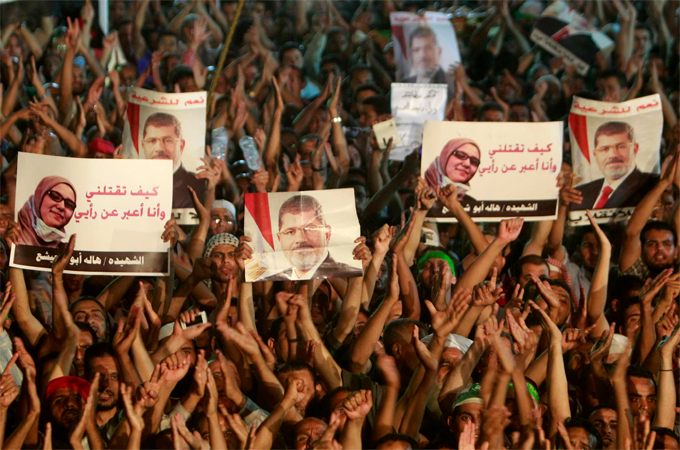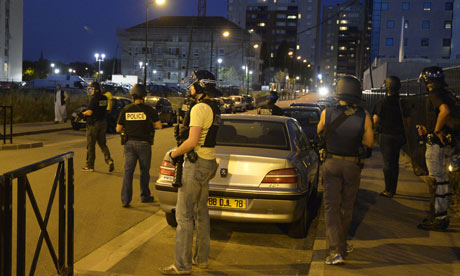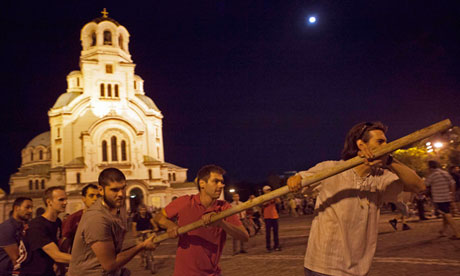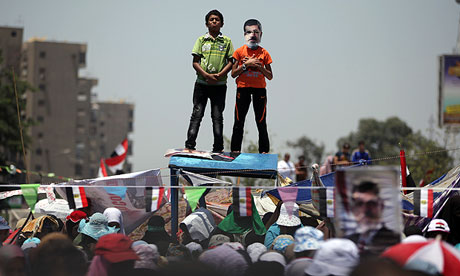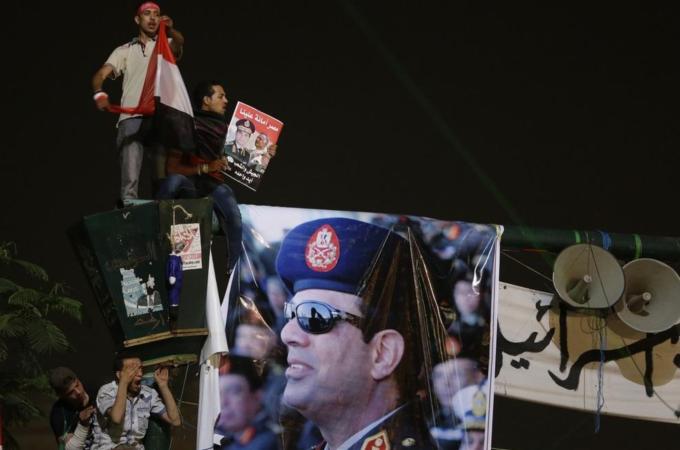When Egyptians poured onto the streets in their millions to demand the fall of President Hosni Mubarak in 2011, few thought they would return two years later demonstrating for the overthrow of the man they elected to replace him.
The stunning fall from power of President Mohamed Morsy, and the Muslim Brotherhood which backed him, has upended politics in the volatile Middle East for a second time after the Arab Spring uprisings toppled veteran autocrats.
Some of the principal causes were highlighted a month before the army intervened to remove Morsy, when two of Egypt's most senior power brokers met for a private dinner at the home of liberal politician Ayman Nour on the island of Zamalek, a lush bourgeois oasis in the midst of Cairo's seething megalopolis. It was seen by some as a last attempt to avert a showdown.
The two power brokers were Amr Moussa, 76, a long-time foreign minister under Mubarak and now a secular nationalist politician, and Khairat El-Shater, 63, the Brotherhood's deputy leader and most influential strategist and financier. Moussa suggested that to avoid confrontation, Morsy should heed opposition demands, including a change of government.
"He [Shater] acknowledged what I said about the bad management of Egyptian affairs under their government and that there is a problem," Moussa told Reuters. "He was talking carefully and listening attentively."
Shater, a thick-set grizzly bear of a man who is now in detention and cannot tell his side of events, replied that the government's problems were due to the "non-cooperation of the ‘deep state'" - the entrenched interests in the army, the security services, some of the judiciary and the bureaucracy, according to Moussa's account.
"The message that I got after one hour was that OK, he would discuss with me, agree with some of my arguments, disagree with the rest, but they were not in the mood of changing," Moussa said. Nour gave a similar account, saying Shater did not budge. But he added that the talks might have started a process of political compromise had they not been exposed in the media.
"[Shater] is a normal person and his appearance does not do him justice. His appearance gives the impression of mysteriousness and ruthlessness, but he is well-mannered and gentle," Nour said.
The dinner on a terrace around the swimming pool of Nour's 8th-floor duplex apartment was cut short when journalists got wind of the meeting. Moussa left convinced that the Brotherhood were over-confident, incompetent in government and had poor intelligence on what was brewing in the streets and the barracks.
Yet many Egyptian and foreign observers still expected the tightly knit Islamist movement, hardened by decades of repression, to dominate Egypt and the region for a prolonged period, after 60 years of rule by army-backed strongmen. Instead, Morsy was bundled out of office and into military detention on 3 July amid huge anti-government protests, barely a year after he became the first democratically elected leader of the Arab world's most populous nation.
Morsy's failure sends a powerful message: winning an election is not sufficient to govern Egypt. Post-Mubarak rulers need the acquiescence of the security establishment and of the population at large. Upset either and your position is not secure.
Egypt's Islamists may draw the bitter lesson that the "deep state" will not let them wield real power, even with a democratic mandate. This report, compiled from interviews with senior Muslim Brotherhood and secular politicians, youth activists, military officers and diplomats, examines four turning points on Egypt's revolutionary road: the Brotherhood's decision to seek the presidency; the way Mursi pushed through the constitution; the failures of the secular opposition; and the military's decision to step in.
Mursi and some senior Muslim Brotherhood leaders, who have been held incommunicado since the coup, could not be reached for comment.
With the Brotherhood angrily resisting its eviction from power, the prospects of Egypt's second transition to democracy being smoother than the first look slight. This time, the army says it does not wish to exercise power directly as it did in 2011-12 after Mubarak's fall. But few doubt that armed forces commander General Abdel Fattah al-Sisi, who planned Morsy's overthrow and has since been promoted to deputy prime minister as well as minister of defense, is the man now in control.
TO RUN OR NOT TO RUN?
In the immediate aftermath of Mubarak's overthrow, the Brotherhood had no intention of ruling. It reassured secular Egyptians and the army by promising publicly not to seek the presidency or an outright parliamentary majority.
"I met Shater three times in 2011/2012 and each time it was clear that the political appetite was growing, but the first time he was extremely explicit that the Brotherhood would not seek political power right away," said U.S. academic Nathan Brown, a leading expert on Egypt at the Carnegie Endowment for International Peace. "He was very clear to the reasons: the world's not ready for it, Egypt's not ready for it, and - the phrase he kept using - the burdens of Egypt are too big for any one political actor. Those turned out to be very sound judgments but he abandoned them."
Events began to take on a momentum of their own. The Brotherhood won control of parliament in alliance with smaller Islamist and independents, but soon found that was not sufficient to pass or implement legislation. An army council kept the keys to power.
As the frustrations grew, some members of the Brotherhood - particularly the young - began to press for the movement to change its stance and bid for the presidency and the executive power it would bring.
"The entire council of the Guidance Office of the Muslim Brotherhood was against the presidential nomination," said Gehad El-Haddad, 31, one of the leading young Islamists. So Haddad and 16 other youth activists exploited Facebook and Twitter to change minds.
"We lobbied, the youth of the Muslim Brotherhood, we literally lobbied. We put up a chart of the Shura Council members and decided which ones to pressure to change their vote," the British-educated activist, now the movement's spokesman, said in a midnight interview at a pro-Morsy protest camp outside a mosque in eastern Cairo. "The Muslim Brotherhood takes its vote from the grass roots up, even that vote."
Opponents argued that the quest for executive power was premature and would fuel suspicion and hostility towards the Brotherhood, which had long pursued a patient, gradualist strategy.
The issue came to a head at a marathon closed-door meeting of the Brotherhood's Shura Council at its four-storey headquarters in the hill-top Moqattam district that overlooks Cairo from the south.
"We remained for three days, debating, each team giving the justifications of the opinion it had, whether accepting or rejecting. And when the vote happened, the decision was just by three or four votes," said Essam Hashish, 63, a university engineering lecturer and Shura member.
It was one of the most closely contested votes in the history of the movement and went to three rounds. Just 56 of the 108 members voted on the decisive ballot to put up a candidate for president, while 52 voted against. After that, support for Shater as the Brotherhood's candidate for president became overwhelming.
The Islamists had earlier looked at nominating someone outside their movement, approaching respected judges Ahmed Mekky and Hossam Gheriyani, who had stood up to Mubarak. Both declined.
Insiders said Shater's charisma and ambition were key factors. The furniture and shopping mall magnate was the dominant politician in the movement, described by colleagues and foreign diplomats as a powerful, pragmatic negotiator used to getting his way.
But his candidacy was short-lived. The electoral commission, headed by a Mubarak appointee, disqualified him on the grounds that he had been convicted of a criminal offence in 2007, even if the charges seemed politically motivated.
The mantle of Brotherhood candidate thus fell uncomfortably on the shoulders of Morsy, a provincial engineering professor who had studied in the United States but had less political savvy and public-speaking ability than Shater.
"When we took the decision to nominate Morsy, after the withdrawal of Khairat El-Shater, he (Morsy) returned home weeping: he had been given a responsibility that he had not sought," Hashish said. "It was known that whoever took responsibility at this time would not find the road covered in roses. But we also knew that there was nobody at that time who could undertake this the way we could."
Morsy narrowly won the presidential election on the second round of voting with 51.73 percent of the vote against Ahmed Shafik, a former air force general who was Mubarak's last prime minister and faithful ally. The chubby, bespectacled Islamist owed his victory partly to the support of liberal and leftist candidates who threw their weight behind him between the two rounds. Their supporters hated Shafik and were given a string of assurances that Morsy would form an inclusive government, and involve them and civil society in drafting a new constitution.
Voters who switched from secular candidates on the first round to Morsy in the run-off were dubbed "lemon squeezers" in reference to the Egyptian tradition of making unpalatable food edible with a splash of lemon juice.
RAMMING THROUGH THE CONSTITUTION
Morsy moved swiftly to shake up the military after his inauguration on June 30, 2012. Within six weeks, he summoned Field Marshal Hussein Tantawi, 76, who had served Mubarak for two decades and was interim head of state after him, and told him to retire, along with the U.S.-trained chief of staff, General Sami Enan. Morsy appointed a pious Muslim, General Abdel Fattah al-Sisi, as commander of the armed forces.
In one of the biggest misunderstandings of his term, the president believed he had stamped his authority on the men in uniform. In reality, the officer corps was willing to see two old retainers put out to pasture, clearing a blocked promotion ladder. "They [the Brotherhood] misread what happened. We allowed it to happen," said one colonel.
The military still viewed with deep suspicion a head of state who, they believed, saw Egypt as "just part of a bigger [Islamic] Caliphate," said the colonel.
Morsy believed the military would not act against him, especially if the Brotherhood took care of the army's economic interests when drafting a new constitution. "He thought Sisi was his guy," a senior Western diplomat said. "He didn't understand the power dynamics."
When Morsy and the Brotherhood pushed for a new constitution they clashed with secular parties and civil society groups angered by the Islamist tinge to the charter, ambiguous wording on freedom of expression, and the absence of explicit guarantees of the rights of women, Christians and non-government organizations.
After weeks of debate, fear that a judiciary packed with Mubarak-era appointees would dissolve the constituent assembly helped prompt Morsy to issue a decree shielding the assembly from legal challenge and putting the president above judicial review. It was a move borne out of the Brotherhood's deep suspicion that the judiciary was out to undo all its electoral gains. When Morsy rammed the new charter through, the opposition walked out.
"The truth is that the declaration (taking supra-legal powers) was a big mistake," said Nour. It was still possible to rebuild confidence between Morsy and the political forces, he said, "but there was not enough effort from the two sides to rebuild this confidence."
The constitutional decree was a turning point. Ministers were not consulted. Several of Morsy's own staff warned that it would set him on a confrontation course with civil society. Five senior advisers quit. But Morsy displayed the same determination and self-confidence that marked his other key decisions.
"One thing we know about this president, he is as stubborn as hell," said Gehad El-Haddad, a Brotherhood member whose father Essam El-Haddad, a British-trained doctor, was Morsy's politically moderate top foreign policy adviser and is now in detention with him.
REJECTING THE OUTSTRETCHED HAND
The constitutional decree triggered weeks of street demonstrations outside Morsy's Ettehadiya palace, which was regularly attacked with petrol bombs, rocks and metal bolts. Frustrated at the failure of the police and the Republican Guards to protect the presidency, the Brotherhood fielded its own well-drilled security guard outside the palace in pitched battles with anti-Morsy protesters on 6 December.
The protests eventually faded, but that single sighting of an organized Brotherhood force in the streets, albeit without visible firearms, further alarmed both the secular opposition and the army.
Another wave of protests rolled over Egypt starting on 25 January, the second anniversary of the uprising that overthrew Mubarak, while the main cities in the Suez Canal zone, where passions were running high over deaths in clashes at a soccer match, spun out of government control. Morsy imposed a curfew on Port Said, epicenter of the troubles. But he struggled to command obedience.
"People at night were playing football with the army which was supposed to be imposing the curfew," said Mekky, who had become justice minister. "So when I [as president] impose a curfew and I see neither my citizens nor my army that are supposed to implement the curfew are listening to me, I should know that I am not really a president."
On 29 January, the army issued the first of a series of solemn warnings that political unrest was pushing Egypt to the brink of collapse and that the armed forces would remain "the solid and cohesive block" on which the state rests. In hindsight, it was a harbinger of military intervention.
With the exception of Nour, the liberal and secular opposition boycotted any contact with Morsy and the Brotherhood's political wing after the constitution episode.
But the European Union, supported by the United States, launched a discreet diplomatic effort to try to bring the two sides to compromise on a national unity government. The aim was to trigger fresh parliamentary elections and a loan agreement with the International Monetary Fund (IMF) that could have unlocked stalled economic aid and investment.
For months, EU diplomat Bernardino Leon shuttled between the leaders of the six-party opposition National Salvation Front (NSF) alliance, Morsy's office and the Brotherhood's political wing, while keeping in touch with the army. By April, Leon had produced a draft deal that would have required both Morsy and his opponents to compromise.
Morsy never explicitly embraced the EU initiative, submitted to him in an email on April 11, although he never rejected it either. Events soon put a deal out of reach.
Haddad, one of the Brotherhood negotiators with Leon, suggested the leaders of the NSF were too divided to deliver on an agreement. Khaled Dawoud, the NSF's spokesman, acknowledged the coalition was full of "big characters and big egos," but said they had held together when it mattered.
Perhaps the main reason the deal foundered was that the Islamists considered the NSF politically insignificant. "There are only two players in this playground, the old regime...and the Muslim Brotherhood, and the rest just choose a camp. It is not a reality that everyone likes, but it is the reality, you can't change that," Haddad said.
When EU foreign policy chief Catherine Ashton returned to Cairo with Leon on 18-19 June, the situation had deteriorated. "We found President Morsy far from reality," a member of Leon's team told Reuters. "The message of the visit was to tell him, ‘Mr President, you are running out of time. The country is running out of time'."
THE COST OF LIVING
The Brotherhood had inherited a shattered economy from the military-led interim government. In the 17 months between Mubarak's fall and Mursi's inauguration, foreign currency reserves crumpled from $36 billion to $15.5 billion - hardly enough to cover three months' imports. Cairo owed international energy companies about $8 billion in unpaid bills, prompting gas producers to reduce shipments to Egypt, freeze investment and slow domestic gas output.
Tourists and investors were scared away by images of violent street protests and political instability. The military council had vetoed a first attempt after the revolution to agree a loan with the International Monetary Fund, wanting to avoid piling debt on the country or compromising national sovereignty. Insiders in the early interim governments said the generals were also scared of triggering riots if they accepted IMF demands to curb food and fuel subsidies.
A former senior finance ministry official said Morsy's constitutional decree effectively ruined any further prospect of an IMF loan. "What happened with the constitution showed the nation was split," said the official. The risk of instability deterred the IMF.
Financial support from Saudi Arabia and the United Arab Emirates dried up because of their hostility to the Brotherhood, seen as a threat to Arab monarchies. Mursi became dependent on the gas-rich emirate of Qatar, which provided some $8 billion in loans, grants and deposits under his rule, with lesser sums from Turkey and Libya, both more sympathetic to the Brotherhood.
The inefficient system of subsidizing bread, cooking gas and diesel fuel became an ever greater burden on government finances, accounting for almost the entire budget deficit. There were shortages of diesel, with long lines at gas stations, sometimes causing fights at the pumps. Power cuts worsened in the run-up to mass protests on June 30, leaving many households without air conditioning for hours as peak summer heat approached. As the Egyptian pound tumbled in value, inflation hit 9.75 percent in June.
Feeling increasingly besieged, the Brotherhood accused saboteurs loyal to the former regime of manipulating fuel and electricity supplies. Many Egyptians blamed government incompetence.
"The biggest form of obstruction was the failure of the Ministry of the Interior to do its job. Imagine a state with no security," said Bassem Ouda, 43, minister of supply for the last six months and a rising star in the Brotherhood. Interviewed at the pro-Morsy sit-in, he accused the ministry of directing criminal gangs that obstructed fuel distribution in the days that led up to 30 June.
Economic grievances fuelled public support for a petition by the "Tamarod - Rebel!" youth movement demanding Morsy's resignation and an early presidential election. Launched on 1 May by three activists in their twenties armed with little more than mobile phones and laptops, the petitions spread like wildfire.
Khaled Dawoud, the NSF spokesman, recalled attending an early Tamarod news conference on 12 May. "They held it in some miserable office ... you couldn't even breathe in that building," he said. "And then they announced, boom, inside that room, that in a matter of days, weeks, we gathered two million signatures - people saying we want early president elections."
He said that when he went to his next NSF meeting, he told his leaders: "OK, we can go on the record, these are brilliant people, we have to support them."
By 30 June, the organizers claimed to have 22 million signatures with addresses and national identity numbers. There was no independent verification, but the movement had clearly hit a national nerve. Mahmoud Badr, 28, the young journalist who co-founded the group, told Reuters that Tamarod had succeeded where others failed by dint of shoe-leather campaigning and savvy use of social media.
Brotherhood officials are convinced that Tamarod was bankrolled and abetted by Gulf money, exiled Egyptian oligarchs and the army. The reality appears to have been more spontaneous and less conspiratorial, though some unfamiliar faces with suspected links to the security services began to appear at Tamarod campaign offices in the final days.
Billionaire businessman Naguib Sawiris, who left Egypt shortly after Morsy's election, told Reuters he threw his full support behind the youth movement.
"The Free Egyptians party, the party that I founded, used all its branches across Egypt to (gather) signatures for Tamarod," Sawiris said in a telephone interview from his yacht off the Greek island of Mykonos. "Also the TV station that I own and the newspaper, Al-Masry Al-Youm, were supporting the Tamarod movement with their media ... It is fair to say that I encouraged all the affiliations I have to support the movement. But there was no financing, because there was no need."
ANOTHER FLAWED TRANSITION
Exactly when the military decided it would overthrow Morsy is disputed. Senior officers said that General Sisi, up until the last day of his ultimatum for the president to accept a power-sharing agreement, continued to hope Morsy would agree to call a referendum on the continuation of his rule. That would have given a constitutional fig-leaf to his departure.
A senior army colonel said the military had acted to save the country from civil war. "This has nothing to do with the army wanting power, but with the people wanting the army to be involved. They trust us, you know, because we will always be with the Egyptian people, not with a person or a regime," he said.
The military now faces the same conundrum it failed to solve in 2011-12: how to make Egypt work without taking responsibility, and hence unpopularity, for painful reforms?
In their first temporary stint in power, the generals presided over a period of economic stagnation, unabated human rights abuses and scant reform. They seemed almost relieved to hand the poison chalice to Morsy upon his election, even though they did not trust the Brotherhood with all the levers of power.
This time, it's different, said the colonel. The army will not govern and there will be a short, sharp transition to elected civilian government. Yet despite a sudden infusion of $12 billion in Saudi, UAE and Kuwaiti aid, the starting conditions look worse than for the previous period of military rule.
The Brotherhood is entrenched in sullen opposition, determined to prevent the new technocratic government succeeding where its own administration failed. The army vacillates between saying it wants to include the Brotherhood in a new political process and cracking down on its leaders, accused of inciting violence and betraying the country. Morsy, his closest aides and the Brotherhood's most powerful politicians are being held in extra-judicial custody by the army at undisclosed locations.
Those leaders still at large say they have begun a long march of non-violent resistance until the Brotherhood prevails over the army. But a radical fringe of Islamists may revert to armed struggle and assassinations. First signs are visible in the lawless Sinai peninsula. Others may go back to a strategy of Islamizing Egyptian society from the grassroots up, rather than the top down.
Repression will only strengthen the Brotherhood, said Haddad. "This is an organization built for 85 years under oppressive regimes. That is our comfort zone. They just pushed us back into it.
"This is a stand-off. Either we force the military's head back into their barracks, and they have to be taught a lesson not to pop their head back into the political scene ever again, or we die trying."
Source URL (retrieved on 28/07/2013 - 02:41): http://www.egyptindependent.com/node/1979311

